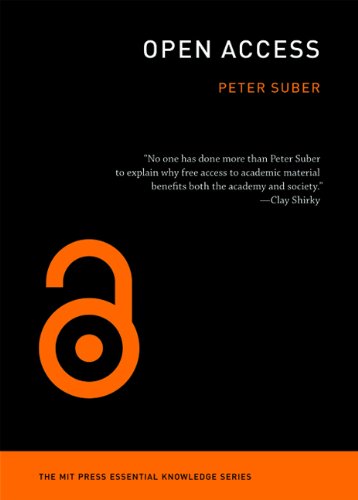
Open Access
by Peter Suber
Publisher: The MIT Press 2012
ISBN/ASIN: 0262517639
ISBN-13: 9780262517638
Number of pages: 255
Description:
In this concise introduction, Peter Suber tells us what open access is and isn't, how it benefits authors and readers of research, how we pay for it, how it avoids copyright problems, how it has moved from the periphery to the mainstream, and what its future may hold. Distilling a decade of Suber's influential writing and thinking about open access, this is the indispensable book on the subject for researchers, librarians, administrators, funders, publishers, and policy makers.
Download or read it online for free here:
Download link
(multiple formats)
Similar books
 Access to Knowledge in the Age of Intellectual Property
Access to Knowledge in the Age of Intellectual Propertyby Gaelle Krikorian, Amy Kapczynski - Zone Books
The book maps the emerging field of A2K activism as a series of historical moments, strategies, and concepts. It gathers some of the most important thinkers and advocates in the field to make the strategies at play in this new domain visible.
(12173 views)
 Intellectual Property Rights
Intellectual Property Rightsby Thomas G. Field Jr. et al. - U.S. Department of State
Intellectual property issues are getting more and more attention these days. It is worth spending some time considering how intellectual property rights (IPR) developed and what role they play in achieving widely shared objectives.
(18443 views)
 The Digital Rights Movement
The Digital Rights Movementby Hector Postigo - The MIT Press
Drawing on social movement theory and science and technology studies, the author Hector Postigo presents case studies of resistance to increased control over digital media, describing a host of tactics that range from hacking to lobbying.
(5885 views)
 Against Intellectual Property
Against Intellectual Propertyby Stephan N Kinsella - Ludwig von Mises Institute
The author argues that the existence of patents, copyrights and trademarks are contrary to a free market. They all use the state to create artificial scarcities of non-scarce goods and employ coercion in a way that is contrary to property rights.
(13431 views)